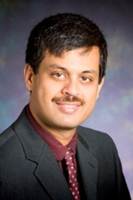Keynote Speech
 |
Abstract: Scheduling algorithms for wireless networks and data centers have been studied primarily from the perspective of throughput optimality. Delay optimality, on the other hand, is often difficult to establish, except for special network topologies. An alternative is to study the delay performance of an algorithm in the so-called heavy-traffic regime. Typically heavy-traffic optimality is studied using fluid and reflected Brownian motion limits. In this talk, we will present an alternative technique based on the following simple observation: the drift of appropriately chosen functions of queue lengths is equal to zero in steady-state. Using the drift technique, we resolve an open conjecture regarding the delay performance of scheduling algorithms in large networks. Joint work with Atilla Eryilmaz, Siva Theja Maguluri, and Sai Kiran Burle.
Bio: R. Srikant is the Fredric G. and Elizabeth H. Nearing Endowed Professor of Electrical and Computer Engineering at the University of Illinois at Urbana-Champaign. His current research interests are in the areas of communication networks and machine learning. He is a recipient of the IEEE INFOCOM Achievement Award, and is currently the Editor-in-Chief of the IEEE/ACM Transactions on Networking.
 |
Abstract: In almost anything in life, including in the transmissions in wireless networks, scheduling is a cornerstone for order and performance. Specifically in wireless networking, scheduling has been among the first problems to be studied in depth. It is in fact amazing how the problem unfolds and reveals its multiple facets as we try to formulate it and solve it. After a brief primer on what we know about scheduling, this talk will focus on one most interesting version which combines the multiple access, networking, and physical layers in a tractable way, and, furthermore, can serve as a building block for more ambitious and complex scheduling problems. This version has to do with emptying the contents of the buffers of all the nodes that share a common channel in minimum time. After reviewing recent progress on this problem we propose and develop a formulation that characterizes fully the optimal solution. Attention: optimal, not only in the sense of deciding which nodes transmit and for how long, but also at what bit-rate for given power levels and channel characteristics. The resulting solution is simple to describe but still complex to realize.
Bio: Anthony Ephremides holds the Cynthia Kim Professorship of Information Technology at the Electrical and Computer Engineering Department of the University of Maryland in College Park where he is a Distinguished University Professor and has a joint appointment at the Institute for Systems Research, of which he was among the founding members in 1986. He obtained his PhD in Electrical Engineering from Princeton University in 1971 and has been with the University of Maryland ever since. He is the author of several hundred papers, conference presentations, and patents, he has received numerous awards, has served the Profession in numerous ways, and his research interests lie in the areas of Communication Systems and Networks and all related disciplines, such as Information Theory, Control and Optimization, Satellite Systems, Queueing Models, Signal Processing, etc. He is especially interested in Wireless Networks and Energy Efficient Systems.
 |
Abstract: One of the fundamental problems in a cognitive radio network, known as the multichannel rendezvous problem, is for two secondary users to find a common channel that is not blocked by primary users. A common approach for solving such a problem in the literature is for the two users to select their own channel hopping sequences and then rendezvous when they both hop to a common unblocked channel at the same time. In this talk, we give an overview of various lower bounds on the time-to-rendezvous of the multichannel rendezvous problem in various settings. We also give intuitive explanations for various channel hopping sequences to be optimal in various settings. These include the classical wait-for-mommy strategy in the asymmetric setting, the walks on finite projective planes in the symmetric and synchronous setting, and the sawtooth sequences and difference-set-based hopping sequences in the symmetric and asynchronous setting. We also discuss how unique ID and available channel set can be used for speeding up the rendezvous process in the multichannel rendezvous problem.
Bio: Prof. Cheng-Shang Chang received the B.S. degree from National Taiwan University, Taipei, Taiwan, in 1983, and the M.S. and Ph.D. degrees from Columbia University, New York, NY, USA, in 1986 and 1989, respectively, all in Electrical Engineering. From 1989 to 1993, he was employed as a Research Staff Member at the IBM Thomas J. Watson Research Center, Yorktown Heights, N.Y. Since 1993, he has been with the Department of Electrical Engineering at National Tsing Hua University, Taiwan, R.O.C., where he is a Tsing Hua Chair Professor. His current research interests are concerned with network science, high speed switching, communication network theory, and mathematical modeling of the Internet. Dr. Chang received an IBM Outstanding Innovation Award in 1992, an IBM Faculty Partnership Award in 2001, and Outstanding Research Awards from the National Science Council, Taiwan, in 1998, 2000 and 2002, respectively. He was elected to an IEEE Fellow in 2004. He is the author of the book "Performance Guarantees in Communication Networks" and the coauthor of the book "Principles, Architectures and Mathematical Theory of High Performance Packet Switches." He served as an editor for Operations Research from 1992 to 1999 and an editor for IEEE/ACM Transactions on Networking from 2007 to 2009. He is currently serving as an editor-at-large for IEEE/ACM Transactions on Networking and an editor for IEEE Transactions on Network Science and Engineering.






